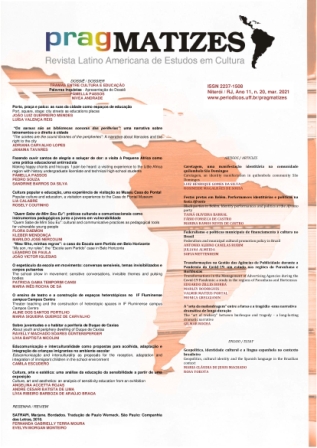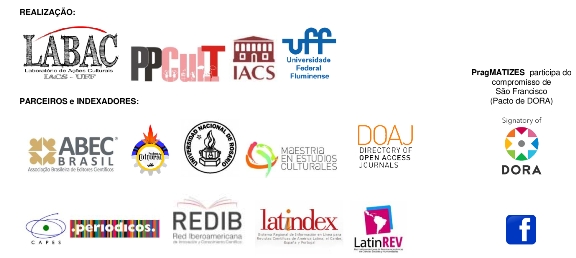Geopolitics, cultural identity and the Spanish language in the Brazilian context
DOI:
https://doi.org/10.22409/pragmatizes.v11i20.46446Abstract
This paper seeks to reflect on the relationship between geopolitical and identity issues and the Spanish language in the Brazilian context, as well as to showhow the intertwining of these elements can be treated in the Spanish language class from an intercultural perspective aiming, at the same time, to teach the language, foster the knowledge of the history of Iberian America and promote the approximation of the Brazilian student to the universe of neighboring peoples. To this end, we rely on the concept of geopolitics and associate it with power relations to show how they influence the degree of importance attributed to languages. We argue that the approach of these components in the classroom sensitizes the student and makes him understand that the study of a foreign language must transcend ideologies and contribute to bringing cultures together, looking at the world from different perspectives and evolving as a human being.
Downloads
References
BAUMAN, Zygmunt. A cultura no mundo líquido moderno. Trad. de Carlos Alberto Medeiros. Rio de Janeiro: Zahar, 2013.
BRASIL. Lei nº 13.415. Dispõe sobre a reforma do ensino médio. Diário Oficial da República Federativa do Brasil. Seção 1. Brasília,17fev.2017. Disponível em: http://pesquisa.in.gov.br/imprensa/jsp/visualiza/index.jsp?jornal=1&pagina=1&data=17/02/2017. Acesso em: 04 jun. 2020.
CORACINI, María José. A celebração do outro. In: CORACINI, Maria José (org.). Identidade e discurso: (des)construindo subjetividades. Campinas: Editora da UNICAMP ; Chapecó: Argos, 2003. p. 201–220.
DERVIN, Fred. Cultural identity, representation and othering. In: JACKSON, Jane. The Routledge Handbook of Language and Intercultural Communication. New York: Routledge, 2014. p. 181-194.
DIARIOS DE MOTOCICLETA. Direção: Walter Salles. Produção: South Fork Pictures e Tu Vas Voir Productions. Estados Unidos, Argentina, Brasil, Peru, Chile: Buena Vista International, 2004. 2h06min.
FIORIN, José Luiz. As relações de poder entre as línguas e a dimensão política de seu uso. In: BASTOS, Neusa Barbosa (org.). Língua portuguesa e lusofonia. São Paulo: EDUC, 2014. p. 51-66.
FREIRE, Paulo. Educação como prática da liberdade. Rio de Janeiro: Paz e Terra, 1986.
IGLESIAS CASAL, Isabel. Construyendo la competencia intercultural: sobre creencias, conocimientos y destrezas. Carabela, n. 54, p. 5–28, 2003.
KUMARAVADIVELU, Bala. Problematizing Cultural Stereotypes. Tesol Quarterly, vol. 37 n. 4, p. 709-719, 2003.
MATOS, Doris. O professor de espanhol como agente intercultural e as articulações necessárias na elaboração de materiais didáticos. In: MATOS, Doris; PARAQUETT, Márcia (orgs.). Interculturalidade e identidades: formação de professores de espanhol. Salvador: EDUFBA, 2018. p. 17–33.
MATTOS, Carlos de Meira. Geopolítica e modernidade: geopolítica brasileira. Rio de Janeiro: Bibliex, 2002.
PARAQUETT, Márcia. Questões imprescindíveis à formação de professores interculturais latino-americanos: o lugar da cultura de tradição oral e afrodescendente. In: MATOS, Doris; PARAQUETT, Márcia (orgs.). Interculturalidade e identidades: formação de professores de espanhol. Salvador: EDUFBA, 2018. p. 73–99.
QUESADA, Sebastián. Imágenes de América Latina. Madri: Edelsa, 2001.
RAFFESTIN, Claude. Por uma geografia do poder. Trad.de Maria Cecília França. São Paulo: Ática, 1993.
RAJAGOPALAN, Kanavillil. O ensino de línguas estrangeiras como uma questão política. In: MOTA, Kátia; SCHEYERL, Denise (orgs.). Espaços linguísticos: resistências e expansões. Salvador, EDUFBA, 2009. p. 57–82.
RODRIGUES, Fernanda dos Santos Castelano. Língua viva, letra morta: obrigatoriedade e ensino de espanhol no arquivo jurídico e legislativo brasileiro. Tese (Doutorado em Letras). Universidade de São Paulo, São Paulo, 2010.
SALOMÃO, Ana Cristina Biondo. O componente cultural no ensino e aprendizagem de línguas: desenvolvimento histórico e perspectivas na contemporaneidade. Trabalhos em Linguística Aplicada, vol. 54 n. 2, p. 361-392, 2015. Disponível em: http://dx.doi.org/10.1590/0103-18134500150051. Acesso em: 26 jan. 2020.
SANTOS, M. A natureza do espaço. São Paulo: Edusp, 2006.
SARMIENTO, Domingo Faustino. Facundo. Buenos Aires: Biblioteca Argentina, 1921.
SERRANI, Silvana. Discurso e cultura na aula de língua. Campinas: Pontes, 2005.
UNESCO. Investir na diversidade cultural e no diálogo intercultural. Relatório Mundial da UNESCO. 2009. Disponível em: http://www.dhnet.org.br/dados/relatorios/r_edh/relatorio_unesco_cultura.pdf. Acesso em: 15 jun. 2020.
WENDT, Alexander. Social theory of international politics. Cambridge: Cambridge University Press, 1999.
Published
How to Cite
Issue
Section
License
Copyright (c) 2020 PragMATIZES - Latin American Journal of Cultural Studies

This work is licensed under a Creative Commons Attribution 4.0 International License.
By forwarding an original to PragMATIZES, the authors agree that the copyright related to it is transferred to the Publishing. Articles and other writings are made available in PDF format from their publication, and they can be downloaded to institutional repositories and personal pages, provided that with their proper bibliographic indication.



